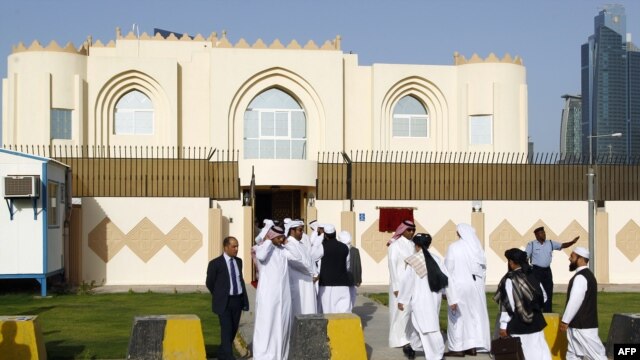Afghanistan: Kabul wants explanation over Taliban office
| Publisher | Radio Free Europe/Radio Liberty |
| Publication Date | 24 June 2013 |
| Cite as | Radio Free Europe/Radio Liberty, Afghanistan: Kabul wants explanation over Taliban office, 24 June 2013, available at: https://www.refworld.org/docid/51d6cb0d12.html [accessed 30 May 2023] |
| Disclaimer | This is not a UNHCR publication. UNHCR is not responsible for, nor does it necessarily endorse, its content. Any views expressed are solely those of the author or publisher and do not necessarily reflect those of UNHCR, the United Nations or its Member States. |
June 24, 2013
By RFE/RL
 Guests arrive for the opening ceremony of the new Taliban political office in Doha on June 18.
Guests arrive for the opening ceremony of the new Taliban political office in Doha on June 18.
The Afghan government says it is willing to talk with the Taliban but first wants answers to questions about an office the militant group opened in Qatar.
The Taliban opened the compound in Doha last week but used its old flag and name when it ruled Afghanistan, angering the government of President Hamid Karzai.
A government spokesman said on June 23 that Kabul was willing to send a delegation to Doha for talks with the Taliban but only after it receives an explanation over the office opening and reassurances the site does not suggest a diplomatic revival by the Taliban.
The Taliban said on June 23 that it had used the flag and name – Islamic Emirate of Afghanistan – with the "agreement of the Qatari government."
The Associated Press, however, reports there was no sign of either the flag or the nameplate at the compound on June 23.
The main U.S. envoy leading efforts to launch talks between the Taliban and Kabul, James Dobbins, is expected to travel to the Afghan capital on June 24 to discuss the matter. Dobbins was in Doha a day earlier for talks, although no details were released after meetings there.
U.S. Secretary of State John Kerry said on June 22 that failure to resolve the dispute could mean the Taliban might be forced to close the Doha office.
Kerry also urged the Taliban to make good-faith efforts to open talks and begin what he called the "difficult" road ahead.
In Tehran, Foreign Ministry spokesman Abbas Araghchi on June 23 dismissed the U.S. role in peace talks, saying only negotiations among Afghan factions can stabilize the country.
The Afghan peace process has made little progress since beginning several years ago.
Analysts put that down to a lack of trust among the major players.
The Taliban has refused to negotiate with Karzai's government, arguing it is Washington that holds true power in Afghanistan.
The opening of the Taliban office in Doha was followed by a decision by Washington to open talks with the Taliban, erecting fresh stumbling blocks.
Angered by those actions, Karzai's government said it would boycott any possible talks with the Taliban and suspend negotiations with Washington over a security agreement to allow U.S. troops to remain in Afghanistan beyond 2014, when most foreign combat troops are scheduled to leave.
With reporting by AP and dpa
Link to original story on RFE/RL website
